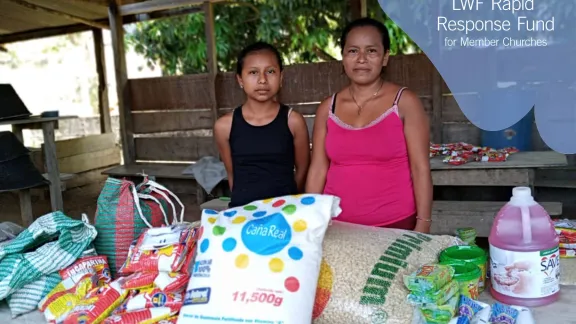
The Lutheran church in Guatemala is one of 48 churches that received funding from the LWFâs COVID-19 Rapid Response Fund (RRF). Photo: ILAG/Diego GIL
Rapid Response Fund: Lutheran church in Guatemala traverses barriers to deliver food supplies
(LWI) - Braving a tropical storm, mudslides and other road obstacles, the Augustinian Lutheran Church of Guatemala (ILAG) safely completed a 12-day mission delivering food to remote villages on a three-month, self-imposed quarantine and curfew to avoid contracting Coronavirus disease (COVID-19).
The spread of COVID-19 in villages where ILAG churches are situated could “devastate entire communities,” said Rev. Karen Castillo, President of ILAG.
ILAG, one of the Lutheran World Federation’s (LWF) newest member churches, has 18 congregations in three regions of Guatemala, most of them in the outermost rural areas of the country serving indigenous communities.
The central offices are located in Guatemala City and travel time to the northern regions could take up to eight hours on a day with no weather constraints or road barriers, but a tropical storm bore down on the country causing dangerous road conditions and delays during the distribution of support.
The project is one of 48 that by July 1 had received funding from the LWF’s COVID-19 Rapid Response Fund (RRF). Thanks to RRF the church was able to hire two trucks, purchase and deliver over 31,700 kilograms of food and sanitation supplies to 362 families.
With no reported or known cases of the virus in the villages, residents have been “effective in protecting the community from COVID-19 infection” by cooperating and agreeing to close off the villages to visitors, staying away from neighboring large towns, adhering to best hygiene practices and with soap donations from humanitarian agencies,” Castillo said.
Commending the members for self-isolation for the good of the whole, Castillo said the villages “called on us to serve” when basic food staples and sanitation products became scarce.
Continuing to exercise preventative measures, ILAG staff was not permitted into some of the villages. In those instances, deliveries were met outside of the villages.
Citing the church’s longtime commitment to “walk with the vulnerable,” Castillo states that even when it was not widely accepted to assist the indigenous people returning home after the Guatemala Civil War; the church was present.
“To respond is part of our ministry. We cannot care about the spirit without caring about the body, the dignity of all – women, men, children and elders.”
The Rapid Response Fund, launched in April, supports many of the communion’s member churches that are particularly vulnerable during the global health emergency. Upon approval of a project application, a church can receive a grant of up to EUR 5,000 from the global fund supported by LWF’s member church partners around the world.
Thanks to the collaboration of the Evangelical Lutheran Church in America (ELCA) and ELCA Companion Synods the ILAG was able to reach most of the vulnerable communities with food and sanitation supplies, as well as pastoral accompaniment.


